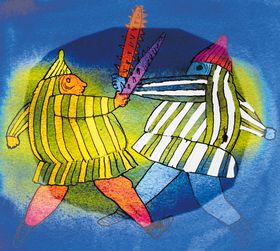Those of us who were in school in the 1970s and earlier had heard of Sudan only in English grammar classes. Our teachers told us that there ought to be a ‘the’ before Sudan, Punjab, Netherlands, Hague, and a few such places.
‘The’ has since disappeared from Punjab, though purists in Pakistan still refer to their Punjab, where Imran Khan is now forcing provincial polls, as ‘the Punjab’. They are also proud of their old University of the Punjab in Lahore, and tell us that what we have are a Panjab University (with ‘a’ in place of ‘u’) in Chandigarh, and a Punjabi University in Patiala. Likewise Sudan retains the article in its official name—it is the Republic of the Sudan. It is another matter that the rest of the world has forgotten not only their ‘the’, but them, too.
Take it from me, ‘the’ will soon vanish from the Netherlands and the Hague too, and there will be grammarians’ funerals all over the English-speaking world.
Sudan amused us in geography classes as one of those African states that got their borders drawn with a ruler. Colonial powers simply drew their borders on maps, “only hindered by the small impediments that we never knew where the mountains and rivers and lakes were,” as British prime minister Lord Salisbury put it in 1890.
Sudan mystified us from the portals of our National Defence Academy in Khadakwasla. Its main block sports a signboard ‘Sudan’. The money for building the block came from Sudan, as a token of gratitude to the Indian Army who had liberated them from Italian occupation in the Second World War.
History lessons introduced us to Lord Kitchener, the big mustachioed general who crushed the Mahdi revolt in Sudan in 1898 (perhaps the first ethno-religious revolt in the Islamic world), acquired a beastly barony over Khartoum, came to India as commander-in-chief, and took on the imperious viceroy Lord Curzon. Their clash set the setting for the civil-military struggle for supremacy in Indian administration.
Curzon lost his personal battle, but his ideas later influenced our national leaders who shaped India as a liberal democracy, where the military remains subordinate to civil authority.
Not so in Kitchener’s Sudan. The country has had six coups since the British left in 1956—three more than in Pakistan—the latest in 2021 by military general Abdel Fattah al-Burhan and militia general Hamdan Dagalo. Together they kicked out the transition regime that had been formed after the deposing of Omar al-Bashir who had ruled for 30 years, and promised to found a new democratic Sudan.
The two, who already had blood on their hands having massacred the enemies of al-Bashir, soon fell out over how Dagalo’s paramilitary would be absorbed into Burhan’s military. The hitch: the military is larger in size but the militia is better equipped and trained. Dagalo refuses to accept a subordinate role, and since last fortnight we are watching a curious spectacle of a state’s official army fighting its official paramilitary.
There is hardly any left-right ideological division between the two, no religious rift, racial hatred, tribal feud, or big power rivalry. There is just crass quest for power.
No, it is not power alone; there are riches too. The desert country has hoards of gold, silver, petroleum, natural gas, chromite, manganese, gypsum, mica, zinc, iron, lead, uranium, copper, cobalt, nickel, tin and aluminium, lying unmined. So just we wait out the civil war, and we will see neighbours and big powers rushing in to fish in the troubled Nile waters and mine in the shifting Nubian sands.
prasannan@theweek.in


